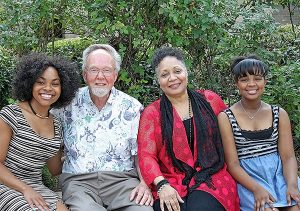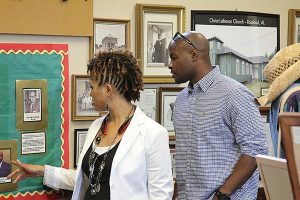By Paula Schlueter Ross (paula.ross@lcms.org)
Famed educator-missionary Dr. Rosa Jinsey Young was known for many things in her lifetime. She was a high-school valedictorian who urged listeners to serve others. A teacher who helped start 30 schools for black children in Alabama. A church planter who helped found 35 Lutheran congregations in the South. An author who penned Light in the Dark Belt, her autobiography.
To the Rev. Dr. McNair Ramsey, one of her former students, “she was always a recruiter for the church.” If she told a young lady, “You’re going to be a teacher,” Ramsey recalls in the new docudrama, “The First Rosa,” “there was no question about it. If she spoke those words over you, somehow the Holy Spirit and the Lord just worked it out” and the young woman would, indeed, become a teacher, he said.

With boys, Young “would place her hand upon their heads and say, ‘You are going to be a preacher.’ And, of course, there were those who didn’t want to be a preacher who would duck and run to keep Dr. Young from placing her hands upon their heads,” Ramsey laughed. Because if she did, “it was almost a given that you were going to be one of those preachers of hers.”
To the Rev. Dr. Ardon Albrecht — who wrote, produced and directed the new film — Rosa Young was “a true theologian” and a bonafide “hero.” Her life reflected prayer, meditation and trial — the three things that make a theologian, Albrecht said, quoting Martin Luther. And, he added, she displayed courage, strength and morality as she withstood adversity — the traits of true heroes, as noted by Russian novelist and philosopher Fyodor Dostoyevsky.
“All Christian heroes are shadows of Christ,” Albrecht said, echoing theologian John Piper. “Rosa Young was truly a shadow of Christ,” and making the film about her life — what the 78-year-old director calls his “swan song” — gave him an “opportunity to lay a figurative wreath at the tomb of someone who to most people has been an unknown Christian hero.”
A ‘fitting’ premiere
Some 300 people were treated to the first public showings of “The First Rosa,” which highlights the struggles and successes of Young, known as “the mother of black Lutheranism in central Alabama.”
Fittingly, the film premiered during the June 4-5 convention of the LCMS Southern District in historic Selma, Ala., on the campus of Concordia College Alabama — the same grounds where Young had served the last 15 years of her career as a teacher and adviser to black students, both there and at the former Alabama Lutheran Academy and College. (She had helped found the academy in 1922.) Young retired in 1961 and received an honorary doctorate from Concordia Theological Seminary that same year. She died 10 years later, at age 81, and is buried in front of the first church she helped plant: Christ Lutheran Church, in her birthplace of Rosebud, Ala.

Two LCMS women were early advocates for producing the film — Susan Hill of Mount Clemens, Mich., who came up with the idea, says she is overjoyed that her “hoping, planning and praying for five years” paid off, and Kaye Wolff of Southfield, Mich., who calls the film “a class act,” especially in light of its tight budget, and said, “Many thanks go out to the dedicated volunteers from Selma.”
With a nod toward civil-rights icon Rosa Parks — who famously refused to give up her bus seat to a white passenger on Dec. 1, 1955 — the completed 42-minute film, “The First Rosa: Teacher, Confessor, Church Planter,” dramatizes the life of Young amid quotes from her autobiography, on which the new docudrama is based.
Three actresses portray Young at different ages in the film:
- Jordan Alexis Donegan plays Young as a child — smart, teaching her siblings how to read, studying the Bible, praying often and vowing to God that “if He would give me a higher education, I would serve Him with it.”
- Jasmine Gatewood is the young-adult Young — starting her first school on her family’s property at age 22, writing to Booker T. Washington for help after boll weevils destroyed the cotton crops and nearly closed her school, and serving alongside Rev. Nils Bakke, a missionary with the Synodical Conference (which included the LCMS), to start schools and congregations throughout central Alabama.
- Yvette Jones-Smedley plays Young in her older years — sharing some of the thoughts and feelings she expressed in her book.
The film includes comments from several of Young’s actual students, now retired, such as Ramsey, quoted earlier.
Also featured, the Rev. John H. Davis Sr. of Robertsdale, Ala., says, “I never lost the dream nor forgot the commitment that I made in 1927 to Rosa J. Young to become a Lutheran minister.”
Recalling Young’s “humble spirit” and “tenacity,” the Rev. James B. Marshall of Mobile, Ala., calls her “a lady who knew what she wanted and was not going to take no for an answer.”
In the film’s introduction, LCMS President Rev. Dr. Matthew C. Harrison says Young’s “is a story that can’t help but inspire you, as it has me.”
‘Story had to be told’
The maker of the film, Albrecht, said he was “hooked on this project” after reading just two chapters of Young’s Light in the Dark Belt: “I realized that Rosa Young, a woman I had never heard of, was a giant among 20th century Christians, a true Lutheran hero whose story had to be told.”
Having produced and directed hundreds of TV shows for the Synod and its auxiliary, the International Lutheran Laymen’s League, during his career, Albrecht spent some three years on “The First Rosa,” which gave him “the opportunity to do it all: write, produce and direct.” He says he’s “very pleased” with the completed film, which included editing assistance from the “enormously talented” Ben DeSousa of NBC’s “Today Show.”
At the recent premiere in Selma, the “positive response” of viewers was “universal and overwhelming,” Albrecht told Reporter.
And he’s “convinced,” he added, “that the LCMS can repeat today what Rosa Young accomplished nearly a century ago. If this film inspires a new generation to devote themselves to missionary outreach like she did, pray unceasingly like she did, meditate on the Gospel like she did, and refuse to bow under the load of trial like she did, there will be a spiritual fire in the LCMS like we’ve not seen since her day.”
Young’s great-niece, Mary Jones Wise of Minneapolis, agrees that “this is a story that needs to be told” and she hopes the new film will impress upon today’s mission-minded Lutherans what one person can accomplish, with God’s help.
Although Jones Wise admitted that some scenes in the film might be “unsettling” for some blacks to watch, “this is a documentary that is very important to The Lutheran Church—Missouri Synod as it seeks to serve all people, especially blacks and the larger community,” she said.
And she hopes the film might be shown on public television at some future date, she added, to let others know about Young’s contributions to education and religion.
The Rev. Thomas Noon, pastor of Zion Lutheran Church, an African-American congregation in Bessemer, Ala., and a voting delegate to the Southern District convention, said watching “The First Rosa” was a “highlight” of the gathering.
Noon said he liked how the film explains the “spiritual legacy” of Young: “What a debt of appreciation” the LCMS owes her for bringing “the Gospel message through education to the Black Belt of Alabama,” he said. “The lifetime dedication of this woman to that end was phenomenal!”
And he “definitely” believes all LCMS congregation members would benefit by seeing the film. “So often we see missions as ‘somewhere else’ rather than in our own backyards. And we see very few stories involving people of color leading the charge like Rosa J. Young,” Noon told Reporter. “I believe this cannot help but to bring a new awareness and support for African-American congregations and missions in our midst.”
Southern District President Rev. Kurtis D. Schultz said the film “brought to life a sister in Christ who I have grown to greatly admire” and Young’s “passionate living was a true reflection of our convention theme, ‘Hope: Jesus Changes Everything.’ “
For many, Schultz added, “the showing of the film enriched their visit to the Dr. Rosa Young Museum on campus.”
Nancy Kaul of Hattiesburg, Miss., a member of the Southern District board of directors, said she “knew very little about Rosa Young’s many contributions” before she saw the film. “As a retired librarian, it was heartwarming to learn of her tenacity and her passion for literacy and education for all people, especially as it applied to opening up the Word of God so that more people could learn about the saving work of Jesus.
“I highly recommend this film to all LCMS congregations, members and friends.”
More showings this fall
Plans call for “The First Rosa” to be shown at various locations this fall, and then for the film to be distributed to Synod congregations and schools, along with accompanying materials, in January 2016.
It’s Albrecht’s dream for every LCMS Lutheran to see the film — and to be inspired by it.
After the district convention closed, he invited students from two local congregations who had served as “extras” in the film to two additional showings, asking them to come see him after the show “if they felt even a faint nudge to become a pastor or teacher.” Several students sought him out afterwards, so — perhaps just as Rosa Young might have done — he talked with them and asked them to stay in touch.
“How exciting it would be if the Lord uses the initial screenings of this documentary to begin drawing today’s young people into full-time pastoral and teaching ministries!” Albrecht said. “And what a grand adventure it will be if He continues to do so with each successive showing.”
(To see photos of the September 2014 filming of “The First Rosa,” click here.)
Posted June 25, 2015 / Updated July 13, 2015




How can non-LCMS Lutheran churches, pastors, or laymen see this film?
I think it will be released in dvd format